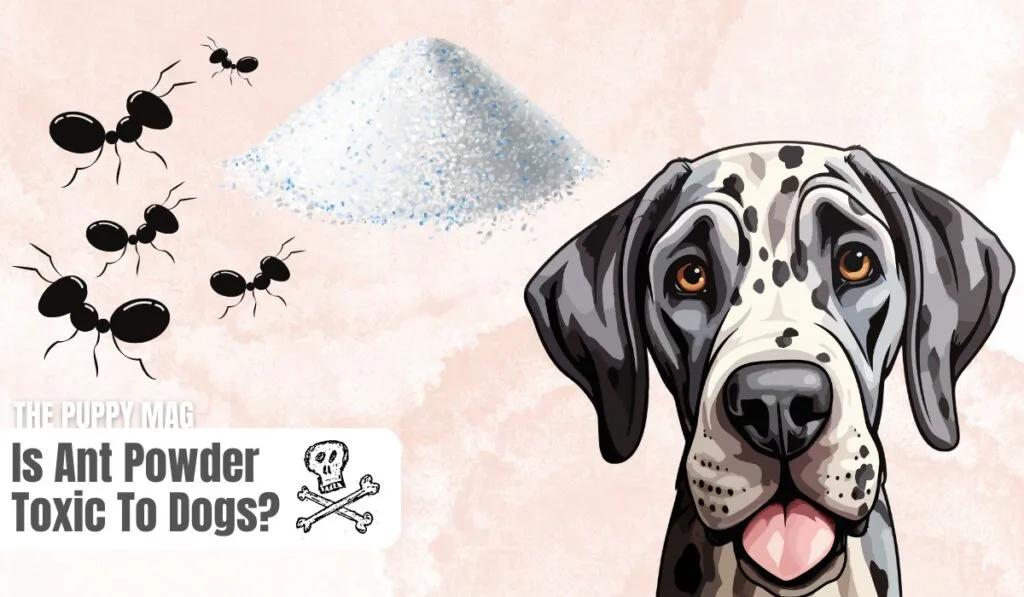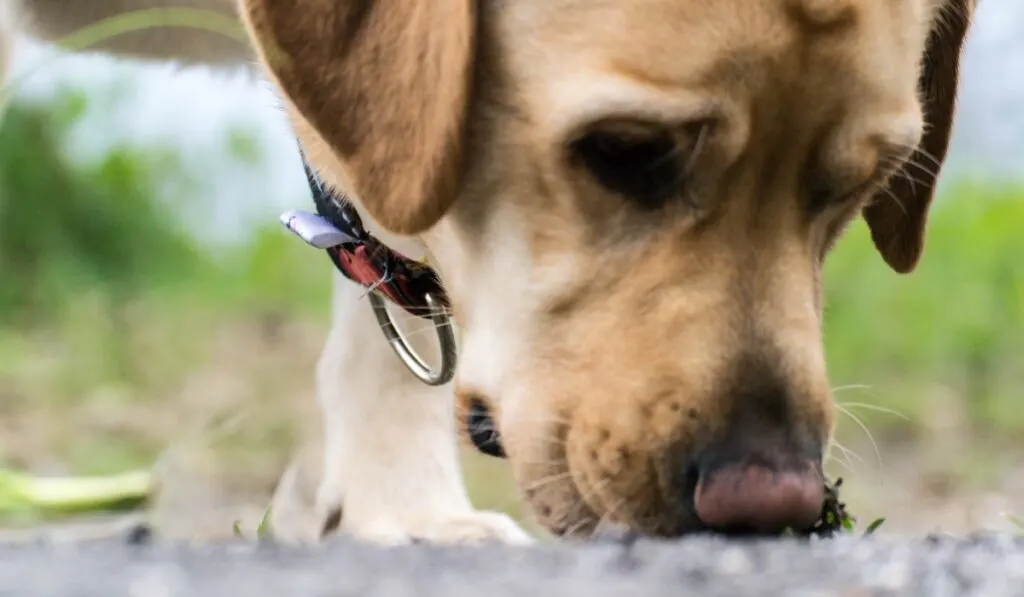Nobody likes having an ant problem. One of the best solutions to that is of course laying down some ant powder. It’s effective and readily available.
BUT it’s not that simple if you own a dog. Ant powder, like most powder designed to kill things, is of course toxic in some kind of way, and many owners ask us whether ant powder is dangerous for our dogs too?
This guide covers absolutely everything you need to know about ant powder and dogs. At the end we’ll even cover some effective ways to remove ants that doesn’t require the use of ant powder.

Ant Powder Basics
Ant powder is a common pesticide used in many households to eliminate ant infestations. It’s generally made up of a variety of chemicals or natural compounds, all designed to kill ants swiftly.
Common ingredients might include Boric Acid, Pyrethroids, or Abamectin, depending on the brand and the formulation.
In general, ant powders work by either dehydrating the ants, damaging their nervous system, or disrupting their digestive process.
While highly effective against ants, these powders can also pose risks to other creatures that come into contact with them – including our beloved dogs.
Is Ant Powder Toxic to Dogs?
In short, yes, ant powder can be toxic to dogs.
The level of toxicity, however, largely depends on the active ingredients within the powder and the amount ingested or inhaled by the dog.
Some chemicals, such as Pyrethroids, are highly toxic to dogs and can cause severe health issues even in small amounts.
Here are some things to remember:
- If your dog ingests a small amount, it may experience mild to moderate gastrointestinal upset, like vomiting or diarrhea.
- In more severe cases, when a large amount has been ingested or if the dog is particularly sensitive, symptoms could include muscle tremors, seizures, or even life-threatening complications.
What About Nippon Ant Powder Specifically?
Nippon Ant Powder, like other ant powders, is designed to control and eliminate ants in and around homes.
The active ingredient in many of Nippon’s products is Permethrin, a type of synthetic Pyrethroid. Permethrin works by interfering with the nervous system of ants and other insects, leading to their demise.
Just like regular ant powder is dangerous to your dog, so too is Nippon Ant Powder.
Just like with other ant powders, dogs that come into contact with Nippon Ant Powder can exhibit symptoms like vomiting, diarrhea, muscle tremors, or seizures.
If you suspect your dog has ingested Nippon Ant Powder or is showing these signs after being in an area treated with it, it’s crucial to contact your vet immediately.
What are the Symptoms of Ant Powder Poisoning in Dogs?
Early recognition of poisoning symptoms can be crucial for the well-being of your dog.
Here are some common signs to look out for:
- Vomiting
- Diarrhea
- Excessive drooling
- Difficulty breathing
- Lethargy or weakness
- Muscle tremors or seizures
- Loss of appetite
If your dog exhibits any of these symptoms after coming into contact with ant powder, contact your vet immediately.
Time is of the essence when dealing with potential poisoning.
For more info visit: Pet Poisoning Help Online
What Should I Do If My Dog Ingests Ant Powder?
If you suspect your dog has ingested ant powder, the first step is to call your vet or a pet poison helpline immediately.
Do not attempt to induce vomiting unless explicitly instructed by a vet, as this can sometimes cause more harm than good.
While waiting for professional advice, remove your dog from the area containing the ant powder to prevent further exposure.
Make sure to collect any remaining substance your dog might have ingested or bring the product package with you when you take your dog to the vet.
This can help the veterinary team identify the exact ingredients involved and determine the appropriate treatment.

What is the Treatment for Ant Powder Poisoning in Dogs?
The treatment for ant powder poisoning in dogs primarily involves eliminating the toxin from the dog’s system and managing the symptoms.
If the dog has recently ingested the ant powder, the vet may induce vomiting or administer activated charcoal to limit further absorption of the poison into the body.
In severe cases, the dog might need hospitalization for monitoring, intravenous fluids to prevent dehydration, and medications to control seizures or other symptoms.
It’s important to remember that every case is unique, and the treatment will depend on the specific circumstances.
Are Smaller Dogs More Affected By Ant Powder Poisoning?
Typically, size more than breed tends to influence a dog’s susceptibility to ant powder poisoning.
Smaller dogs and puppies often face greater risks because even small amounts of toxins can be a significant proportion of their body weight.
However, individual health, age, and pre-existing medical conditions can also influence how a dog responds to such toxins.
Always consult with your vet to understand your pet’s specific risks better.
4 Dog-Safe Ways to Remove Ants
It’s absolutely possible to control and remove ants in a manner that keeps your furry friend safe. Here are some methods that are considered dog-friendly:
1. Natural Ant Repellents:
Several natural substances can deter ants without posing a risk to your pets. Here are some options:
- Vinegar: Wipe down your countertops, cupboards, and any other surfaces where you’ve seen ants with a 50-50 mixture of white vinegar and water. Ants hate the smell of vinegar, and it removes the scent trails they use to get around.
- Cinnamon: Sprinkle ground cinnamon or place cinnamon sticks at the entry points. Ants don’t like the smell and will avoid it.
- Citrus or Cucumber Peels: Ants have a natural aversion to the scent of citrus fruits and cucumber, especially bitter cucumber. Scatter the peels or slices near the entry points.
2. Diatomaceous Earth (Food Grade):
Diatomaceous earth (DE) is a non-toxic powder made up of fossilized aquatic organisms or diatoms. The microscopic razor-sharp edges of DE can cut through the ant’s exoskeletons, gradually causing their body to dry out. Always opt for food-grade DE for pest control to ensure it’s safe for your dog.
3. Use a Professional Pest Control Service:
Consider hiring professionals to deal with an ant infestation. Many pest control companies offer pet-friendly services. They can use products that are safe for pets or even use non-chemical methods to handle the issue.
4. Maintain a Clean Environment:
Prevention is always better than cure. Ants are often attracted to food and water sources. By cleaning up food spills, managing waste properly, and avoiding leaving pet food out for a long time, you can help make your home less attractive to ants.
Remember, each of these methods has its pros and cons, and effectiveness can vary based on the species of ant and the extent of the infestation. Always monitor your dog when trying a new method to ensure they don’t have an unexpected reaction. If you’re unsure, consult with a pet-friendly pest control professional for advice tailored to your situation.
Summary
In conclusion, ant powder can indeed be dangerous for dogs. The toxicity level can vary depending on the type of ant powder and the amount the dog is exposed to.
If your dog shows signs of poisoning, contact your vet immediately. To prevent exposure, always store pesticides out of reach and consider using pet-friendly alternatives when possible.
Your dog’s safety is always paramount, so stay vigilant, informed, and proactive. After all, our furry friends depend on us for their well-being.
